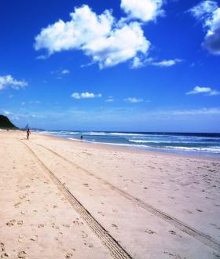Site shows coastal risk to inform future planning
 New tools will help beach towns get ready for more destructive weather.
New tools will help beach towns get ready for more destructive weather.
Local governments, particularly in coastal areas, will bear the brunt of increased weather variability as a result of climate change.
But a new online planning tool has been designed help coastal communities determine where their strengths and vulnerabilities lie and give them the knowledge to prepare for the future.
As the group of Pacific Climate Warriors showed in Newcastle Harbour last week, the immediate threats of shifting weather patterns will have a direct toll on human livelihoods.
The tool on the Coastal Climate Blueprint website, is the result of four year’s work by the University of Tasmania, Murdoch University and CSIRO, all funded by the Fisheries Research and Development Corporation and the Federal Government.
Project leader, Dr Stewart Frusher said that although coastal communities were aware of locally observed climate-related phenomena, there appeared to be little knowledge of flow-on consequences and economic effects.
These elements allow marine climate pressures to take a toll on sectors such as commercial and recreational fishing, marine tourism and aquaculture.
“Our surveys indicate a perception that pressures on the marine environment are coming from sources other than climate change such as fishing pressure. This means there is a certain level of inertia to overcome with respect to convincing communities to undertake marine climate change adaptation planning,” Dr Frusher said.
“We see this as a way forward for coastal communities to manage their climate future.”
Marine economics expert, Murdoch University’s Professor Malcolm Tull says climate pressures including changes in ocean temperatures, the seasonality and location of storms and increasing ocean acidity will all have clear impacts on marine and coastal environments.
In his local area near Geraldton in Western Australia, Professor Tull said better understanding could bring many benefits.
“Geraldton has seen an increase in ocean temperatures and declining strength of the Leeuwin Current which has led to increased stress and caused higher mortality of ‘cool water’ marine species,” Professor Tull said.
“This has led to a decline in rock lobster larvae and while predictions are always uncertain, is expected to cause a decline in breeding stock in the future.
“These changes have already had an impact on employment in fishing and support industries and have led to the decline of the vibrant seasonal communities on the Abrolhos Islands.”
Professor Tull said that communities such as Geraldton can use the blueprint tool to develop strategies to deal with the changes to marine environments brought on by climate change.
“Ocean temperature changes in Geraldton have increased the potential to farm warm water species,” he said.
“The introduction of popular warm water species may also have a positive impact on recreational and charter fishing in the area.”
Community organisations such as Coastcare, fishing associations and tourism authorities are encouraged to have a look at The Coastal Climate Blueprint website and planning tool.







 Print
Print